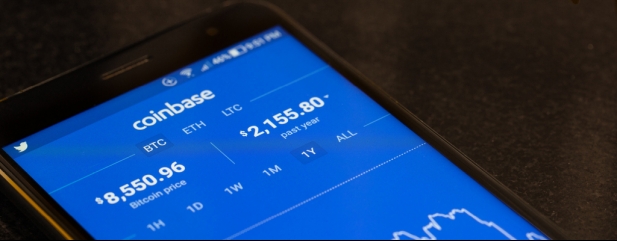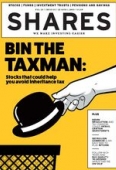Archived article
Please note that tax, investment, pension and ISA rules can change and the information and any views contained in this article may now be inaccurate.
$63 billion Coinbase is an easy way to play bitcoin

Evangelists believe that we have just witnessed the ‘big bang’ of mainstream cryptocurrency acceptance with the triumphant US stock market debut of Coinbase Global.
Coinbase is the largest cryptocurrency exchange in the US, providing a platform for investors to buy, sell and store bitcoin and about 50 other cryptos, including ethereum, litecoin and dash.
It lets investors store cryptocurrencies in its wallet service for free, but charges dealing and margin fees. There are several other lines of business in the pipeline, such as trialling a crypto debit card with partner Visa.
Perhaps more compelling to Shares readers is that Coinbase is one way to land exposure to the potential growth of cryptocurrencies without having to buy the real thing.
The company didn’t go public with a normal IPO (initial public offering), instead using the direct listing format favoured by Spotify and Airbnb.
This meant that instead of relying on brokers to pull in institutional investors to underpin a valuation ahead of the listing, selling shareholders sold stock straight to buyers on day one. This allowed the price to find its own market level as trades were logged, while also letting retail investors buy right from the start just like the financial establishment.
From a reference price of $250, the stock soared to more than $400 before ending its first day at $381.
The timing of the stock market listing was either very astute or very fortunate, coinciding with bitcoin’s record run.
Bitcoin’s surge beyond $63,000 for the first time (13 April) reignited intense discussion about the best-known cryptocurrency. Its meteoric rise in recent months has lured in thousands of Millennial investors with dreams of fast profits thanks to Coinbase’s mobile app which makes buying bitcoin fairly simple.
COINBASE’S EARNINGS STATUS
Investors got a flavour of Coinbase’s financial clout with the publication of its estimated 2021 first quarter earnings. Highlights included:
An estimated $1.8 billion Q1 revenue, a near 10-fold jump from last year’s $191 million.
Approximately $730 million to $800 million net income, versus $32 million in Q1 2020.
$335 billion in trading volume.
6.1 million monthly transactions from 56 million verified customers.
ISSUES TO ADDRESS
It is easy to see why the stock market listing captured enormous attention but investing in Coinbase’s shares come with substantial risks, not least that the whole cryptocurrency phenomenon blows up.
There is huge volatility in bitcoin and other cryptos. In late 2017 bitcoin traded close to $20,000 yet a year later it was worth less than $3,500, staying below $5,000 for months.
More recently, bitcoin ended 2020 worth $28,990, topped $63,000 in early April and, at the time of writing, trades at $60,775. In those three and a bit months bitcoin fell more than 15% three times.
Coinbase has admitted that monthly transacting users, trading volumes, and therefore transaction revenue fluctuate, ‘potentially materially’ with bitcoin and crypto asset volatility. This revenue unpredictability in turn ‘impacts our profitability on a quarter-to-quarter basis,’ it adds.
Another major talking point going forward will be institutional adoption. Dan Ives, an analyst with US broker Wedbush, said the stock listing is a reflection of cryptos’ mainstream evolution as they become increasingly embedded in the global financial system.
Coinbase itself has noted, ‘meaningful growth in 2021 driven by transaction and custody revenue given the increased institutional interest in the crypto asset class’ is expected, but only if banks, payment platforms and other large financial institutions continue to accumulate crypto assets in the coming quarters. If that plays out as Coinbase hopes, the company will be a major beneficiary.
TIGHTENING REGULATION
Investors will need to brace for a lot more regulation around cryptocurrencies. ‘Governments, central banks and regulators will be keen to protect the currency status quo,’ says Nigel Green, founder of financial adviser DeVere. ‘We should expect considerably higher levels of regulation in the crypto market; I believe it is inevitable.’
In the meantime, Coinbase plans to spend heavily to scale its platform and drive marketing in 2021 and beyond, which will cap financial performance.
The shares traded at $326.96 as of 16 April, valuing Coinbase at $63.5 billion. That represents a near-10% premium to the value of the London Stock Exchange (LSE), which has a longer history, a more diversified business model and arguably faces less competition and less regulatory risk.
As for now, Coinbase’s shares offer investors brave enough to enter the bitcoin and cryptocurrency world a way to invest beyond buying cryptos themselves, for good or bad.
Important information:
These articles are provided by Shares magazine which is published by AJ Bell Media, a part of AJ Bell. Shares is not written by AJ Bell.
Shares is provided for your general information and use and is not a personal recommendation to invest. It is not intended to be relied upon by you in making or not making any investment decisions. The investments referred to in these articles will not be suitable for all investors. If in doubt please seek appropriate independent financial advice.
Investors acting on the information in these articles do so at their own risk and AJ Bell Media and its staff do not accept liability for losses suffered by investors as a result of their investment decisions.
Issue contents
Exchange-Traded Funds
Feature
Great Ideas
- It’s a great time to feast on McDonald’s shares
- Tracsis springs to life on summer shows optimism
- This engineering stock is racing higher after yet more earnings upgrades
- Virgin Wines’ shares are cheap for an online retailer and it is profitable
- The oil and gas stock shooting higher as new discovery confirmed
- Elementis is still a buy despite takeover disappointment
- The little known company that’s gone up by 88% since October

 magazine
magazine








